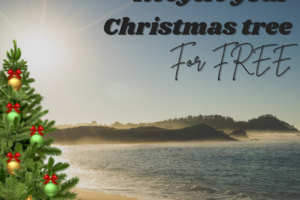We love trees and are passionate about being arborists. Northland’s landscape is dominated by trees, and we do all we can to keep it that way!
However, not all plant species should have pride of place in our neighborhoods. Plant species recognised as weeds, or pest plants, can harm the wider natural environment, our economy, and human and animal health. Become a warrior in the war on weeds.
What are weeds?
Over 80% of New Zealand’s plant species are exotic. Introduced to New Zealand from elsewhere naturalised plants grow and spread on their own without help from humans. Not all plants introduced from foreign places can naturalise, and not all naturalised plants are a problem. The ones causing the most trouble are those which have the potential to invade native bush, displace native shrubs and prevent native plant regeneration. Growing in the wrong place these invasive plants are a major threat to New Zealand’s ecosystem.
Some of the common trees, shrubs, or palms that dominate or replace other plants and alter the composition of native plant communities include brush wattle, wilding conifer, monkey apple, callistemon, loquat, rhus tree, tree privet, Chinese privet, phoenix palm, Taiwan cherry, Brazilian pepper tree, bamboo, and coastal banksia just to name just a few. Both the Northland Regional Council and Weedbusters have great online and hard copy resources available for identifying and raising the awareness of weed species.
In our backyard.
In Northland wilding conifers is a problem. It’s estimated 20% of New Zealand will be covered in unwanted wilding pine trees within 20 years if their spread isn’t stopped. Pinus Radiata sucks up carbon faster than native forests however they drop seeds that quickly take over open ground to grow pine forests.
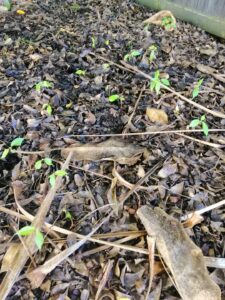
Taiwan cherry seedlings
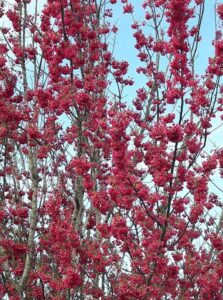
Pink bell-shaped flowers of Taiwan cherry emerge in early spring.
Common weed species we regularly see in our urban areas include Taiwan cherry, Phoenix palm, and tree privet.
Taiwan Cherry.
Considered a weed, the Taiwan cherry’s seeds are long-lived and widely dispersed. It is tolerant of warm and cold climates, low to medium rainfall, and forms dense stands that invade bush areas and crowd out native plants.
Phoenix palm.
Phoenix palm which thrives in a variety of habitats with sharp spines can cause injury to humans and animals. Birds and water spread seeds. It causes damage by displacing native trees through sheer size, and the growth of seedlings can produce an impenetrable, long-lived sub-canopy.
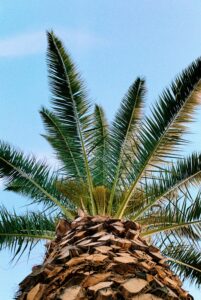
Phoenix palm
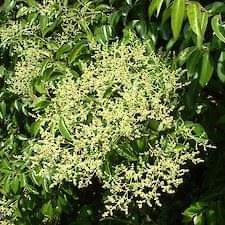
Privet
Privet.
The tree privet produces many highly viable seeds in widely-dispersed berries. Fast-growing, very long-lived (100+ years), and forms very dense, tall stands. Birds, vegetation dumping, and soil movement spread seeds.
Tree privet can form a dense carpet of seedlings on the forest floor and grows through understorey to dominate and replace canopy trees in most forest types. The poisonous berries may impact native fauna, especially insects.
Batwing passiflora.
Also worth a mention is the climbing Batwing passiflora plant. If you identify this plant it must be reported to the Northland Regional Council.
Batwing can grow high into the canopy of tall trees. It can smother, shade, and strangle the vegetation it grows on.
Batwing produces large numbers of fruit, containing around 20 seeds. Hundreds of seedlings have been found under some plants and can grow from stems that touch the ground or from plant fragments. Think Trees have been involved in operations to remove the vine from various treetop locations in the Whangarei areas. Special care is taken to collect any fallen berries and all debris is returned to the Northland Regional Council to be disposed of.
Why should you care?
Weeds are changing the natural balance of plants, animals, and insects in Northland. Many of Northland’s native plants and animals cannot be found anywhere else in the world and many of them are now endangered.
Controlling these weeds is a priority for regional, city, and district councils that spend millions of dollars each year. Volunteers and community groups spend untold hours eradicating weeds to protect their local natural areas.
How can you help?
If you recognise any weed species at your place and you would like to stop the seeds from harming the wider natural environment there are several methods of control that can be used to remove them. What you choose may depend on the size of the tree or how many. Be aware that most pest shrubs and trees will resprout if you simply cut them down making them difficult to eradicate. Remember to dispose of any weeds carefully. Many weeds have spread when people throw away their garden waste instead of composting, burying, or mulching problem plants. Pest plants should be taken to a composting depot or landfill, especially those that can grow from fragments.
Search the database of weed species.
Controlling weeds.
Non-herbicide control you can try includes pulling out the seedlings or ring barking the tree. Using herbicide, you can try techniques such as cut and paint stump treatment, spray, and drill and inject. Both Northland Regional Council and Weedbusters provide all the information you need for both physical and herbicide control of pest shrubs, trees, and palms including how to stop them from coming back.
Plant me instead.
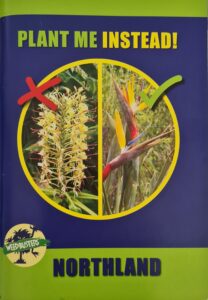
Weedbusters 2011
Plant Me Instead is a great booklet that profiles the environmental weeds of greatest concern in the Northland region. The booklet includes suggestions for non-weedy species that you can use to replace weeds in your garden.
Weed Action Groups.
Nationwide there are groups dedicated to removing pest plants and restoring native habitat. Join the fight in your own backyard or the bush. Join an existing weed action group or form a new one if there is none in your area. In Northland contact Northland Regional Council, Weedbusters for details.
Arboricultural work
Arboricultural work involves a wide range of tree care and tree maintenance management activities such as climbing, pruning, trimming, maintaining, removing, chipping, and stump grinding trees.
